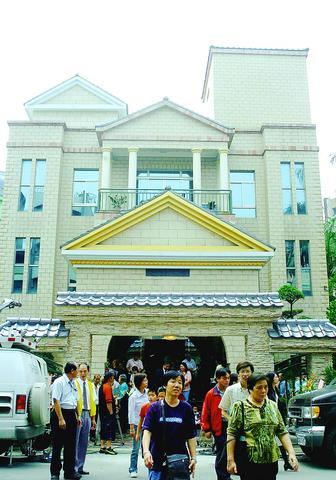Cult leader Sung Chi-li (
He did hold a press conference later, however, at his Kaohsiung residence.

PHOTO: CHANG CHUNG-YI, TAIPEI TIMES
"It wasn't my idea to open the shop. It was one of my followers in Australia who insisted me on doing so," Sung said.
"I am not going to do anything special there. It will only be a place, like a museum, to display my divine photos. It will also be a location for my followers to get together for all kinds of events," he said.
Sung said the 150-ping shop on Er-ling Road in the Hsiaokang district cost his Australian follower approximately NT$100 million.
Yang Chen-chih (
"It is a place for cultural exhibitions. Admission is free," Yang said.
However, only Sung's "divine photos" are on display. The photos usually show Sung with colorful rays of light in the sky and a ring of light around his head.
In 1996 Sung was sued by some followers -- and then indicted on charges of deception -- for obtaining NT$3 billion in donations by claiming to have "supernatural powers" which he could use to help people.
He was convicted of fraud and sentenced to seven years on Oct. 30, 1997, but the High Court overturned the verdict last year, ruling that his activities were simply religious activities, which are protected by the Constitution.
During his trial it was established that the "divine photos" of Sung were enhanced with basic computer graphics. The plaintiffs said Sung used the photos to win people's trust.
During the investigation of the case, Sung insisted that he had supernatural powers and that he could get people to do whatever he commanded.
The police invited him to display his powers in public, but he failed to persuade a police officer who was standing to sit down, despite repeated attempts.
Among Sung's more prominent followers are Kaohsiung Mayor Frank Hsieh (
During a radio interview on Sept. 26, Sung praised Hsieh for his decent character and good heart.
Sung said that Hsieh was the best choice for the Democratic Progressive Party's candidate for the 2008 presidential election.

Alain Robert, known as the "French Spider-Man," praised Alex Honnold as exceptionally well-prepared after the US climber completed a free solo ascent of Taipei 101 yesterday. Robert said Honnold's ascent of the 508m-tall skyscraper in just more than one-and-a-half hours without using safety ropes or equipment was a remarkable achievement. "This is my life," he said in an interview conducted in French, adding that he liked the feeling of being "on the edge of danger." The 63-year-old Frenchman climbed Taipei 101 using ropes in December 2004, taking about four hours to reach the top. On a one-to-10 scale of difficulty, Robert said Taipei 101

Nipah virus infection is to be officially listed as a category 5 notifiable infectious disease in Taiwan in March, while clinical treatment guidelines are being formulated, the Centers for Disease Control (CDC) said yesterday. With Nipah infections being reported in other countries and considering its relatively high fatality rate, the centers on Jan. 16 announced that it would be listed as a notifiable infectious disease to bolster the nation’s systematic early warning system and increase public awareness, the CDC said. Bangladesh reported four fatal cases last year in separate districts, with three linked to raw date palm sap consumption, CDC Epidemic Intelligence

Two Taiwanese prosecutors were questioned by Chinese security personnel at their hotel during a trip to China’s Henan Province this month, the Mainland Affairs Council (MAC) said yesterday. The officers had personal information on the prosecutors, including “when they were assigned to their posts, their work locations and job titles,” MAC Deputy Minister and spokesman Liang Wen-chieh (梁文傑) said. On top of asking about their agencies and positions, the officers also questioned the prosecutors about the Cross-Strait Joint Crime-Fighting and Judicial Mutual Assistance Agreement, a pact that serves as the framework for Taiwan-China cooperation on combating crime and providing judicial assistance, Liang

US climber Alex Honnold left Taiwan this morning a day after completing a free-solo ascent of Taipei 101, a feat that drew cheers from onlookers and gained widespread international attention. Honnold yesterday scaled the 101-story skyscraper without a rope or safety harness. The climb — the highest urban free-solo ascent ever attempted — took just more than 90 minutes and was streamed live on Netflix. It was covered by major international news outlets including CNN, the New York Times, the Guardian and the Wall Street Journal. As Honnold prepared to leave Taiwan today, he attracted a crowd when he and his wife, Sanni,